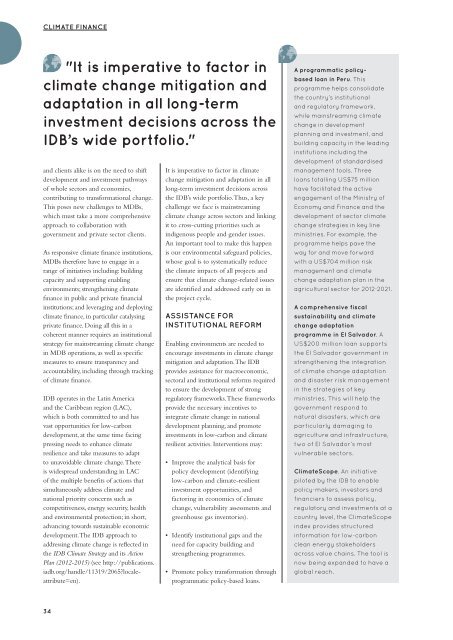Climate Action 2014-2015
You also want an ePaper? Increase the reach of your titles
YUMPU automatically turns print PDFs into web optimized ePapers that Google loves.
CLIMATE FINANCE<br />
"It is imperative to factor in<br />
climate change mitigation and<br />
adaptation in all long-term<br />
investment decisions across the<br />
IDB’s wide portfolio."<br />
and clients alike is on the need to shift<br />
development and investment pathways<br />
of whole sectors and economies,<br />
contributing to transformational change.<br />
This poses new challenges to MDBs,<br />
which must take a more comprehensive<br />
approach to collaboration with<br />
government and private sector clients.<br />
As responsive climate finance institutions,<br />
MDBs therefore have to engage in a<br />
range of initiatives including: building<br />
capacity and supporting enabling<br />
environments; strengthening climate<br />
finance in public and private financial<br />
institutions; and leveraging and deploying<br />
climate finance, in particular catalysing<br />
private finance. Doing all this in a<br />
coherent manner requires an institutional<br />
strategy for mainstreaming climate change<br />
in MDB operations, as well as specific<br />
measures to ensure transparency and<br />
accountability, including through tracking<br />
of climate finance.<br />
IDB operates in the Latin America<br />
and the Caribbean region (LAC),<br />
which is both committed to and has<br />
vast opportunities for low-carbon<br />
development, at the same time facing<br />
pressing needs to enhance climate<br />
resilience and take measures to adapt<br />
to unavoidable climate change. There<br />
is widespread understanding in LAC<br />
of the multiple benefits of actions that<br />
simultaneously address climate and<br />
national priority concerns such as<br />
competitiveness, energy security, health<br />
and environmental protection; in short,<br />
advancing towards sustainable economic<br />
development. The IDB approach to<br />
addressing climate change is reflected in<br />
the IDB <strong>Climate</strong> Strategy and its <strong>Action</strong><br />
Plan (2012-<strong>2015</strong>) (see http://publications.<br />
iadb.org/handle/11319/2065?localeattribute=en).<br />
It is imperative to factor in climate<br />
change mitigation and adaptation in all<br />
long-term investment decisions across<br />
the IDB’s wide portfolio. Thus, a key<br />
challenge we face is mainstreaming<br />
climate change across sectors and linking<br />
it to cross-cutting priorities such as<br />
indigenous people and gender issues.<br />
An important tool to make this happen<br />
is our environmental safeguard policies,<br />
whose goal is to systematically reduce<br />
the climate impacts of all projects and<br />
ensure that climate change-related issues<br />
are identified and addressed early on in<br />
the project cycle.<br />
ASSISTANCE FOR<br />
INSTITUTIONAL REFORM<br />
Enabling environments are needed to<br />
encourage investments in climate change<br />
mitigation and adaptation. The IDB<br />
provides assistance for macroeconomic,<br />
sectoral and institutional reforms required<br />
to ensure the development of strong<br />
regulatory frameworks. These frameworks<br />
provide the necessary incentives to<br />
integrate climate change in national<br />
development planning, and promote<br />
investments in low-carbon and climate<br />
resilient activities. Interventions may:<br />
Improve the analytical basis for<br />
policy development (identifying<br />
low-carbon and climate-resilient<br />
investment opportunities, and<br />
factoring in economics of climate<br />
change, vulnerability assessments and<br />
greenhouse gas inventories).<br />
Identify institutional gaps and the<br />
need for capacity building and<br />
strengthening programmes.<br />
Promote policy transformation through<br />
programmatic policy-based loans.<br />
A programmatic policybased<br />
loan in Peru. This<br />
programme helps consolidate<br />
the country’s institutional<br />
and regulatory framework,<br />
while mainstreaming climate<br />
change in development<br />
planning and investment, and<br />
building capacity in the leading<br />
institutions including the<br />
development of standardised<br />
management tools. Three<br />
loans totalling US$75 million<br />
have facilitated the active<br />
engagement of the Ministry of<br />
Economy and Finance and the<br />
development of sector climate<br />
change strategies in key line<br />
ministries. For example, the<br />
programme helps pave the<br />
way for and move forward<br />
with a US$704 million risk<br />
management and climate<br />
change adaptation plan in the<br />
agricultural sector for 2012-2021.<br />
A comprehensive fiscal<br />
sustainability and climate<br />
change adaptation<br />
programme in El Salvador. A<br />
US$200 million loan supports<br />
the El Salvador government in<br />
strengthening the integration<br />
of climate change adaptation<br />
and disaster risk management<br />
in the strategies of key<br />
ministries. This will help the<br />
government respond to<br />
natural disasters, which are<br />
particularly damaging to<br />
agriculture and infrastructure,<br />
two of El Salvador’s most<br />
vulnerable sectors.<br />
<strong>Climate</strong>Scope. An initiative<br />
piloted by the IDB to enable<br />
policy-makers, investors and<br />
financiers to assess policy,<br />
regulatory and investments at a<br />
country level, the <strong>Climate</strong>Scope<br />
index provides structured<br />
information for low-carbon<br />
clean energy stakeholders<br />
across value chains. The tool is<br />
now being expanded to have a<br />
global reach.<br />
34












